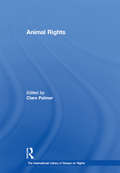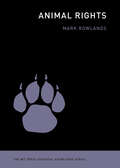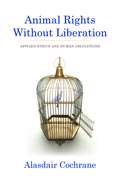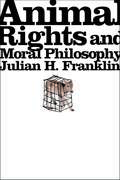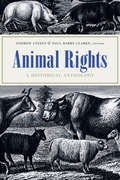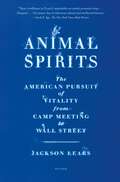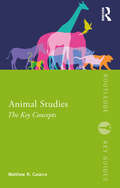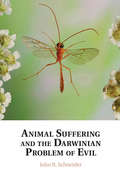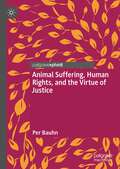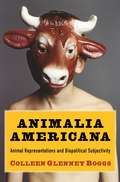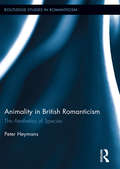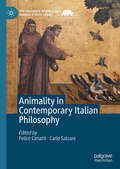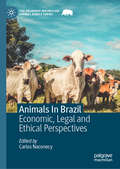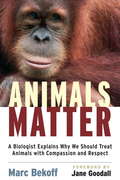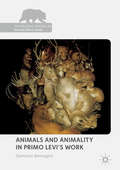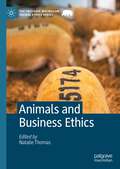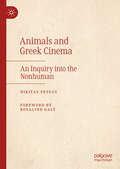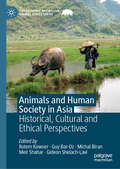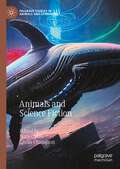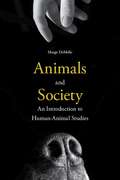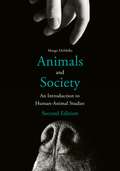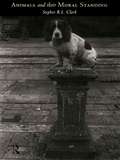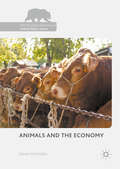- Table View
- List View
Animal Revolution
by Ron BroglioWhy our failure to consider the power of animals is to our deep detriment Animals are staging a revolution—they&’re just not telling us. From radioactive boar invading towns to jellyfish disarming battleships, this book threads together news accounts and more in a powerful and timely work of creative, speculative nonfiction that imagines a revolution stirring and asks how humans can be a part of it. If the coronavirus pandemic has taught us anything, it is that we should pay attention to how we bump up against animal worlds and how animals will push back. Animal Revolution is a passionate, provocative, cogent call for us to do so.Ron Broglio reveals how fur and claw and feather and fin are jamming the gears of our social machine. We can try to frame such disruptions as environmental intervention or through the lens of philosophy or biopolitics, but regardless the animals persist beyond our comprehension in reminding us that we too are part of an animal world. Animals see our technologies and machines as invasive beings and, in a nonlinguistic but nonetheless intensive mode of communicating with us, resist our attempts to control them and diminish their habitats. In doing so, they expose the environmental injustices and vulnerabilities in our systems. A witty, informative, and captivating work—at the juncture of posthumanism, animal studies, phenomenology, and environmental studies—Broglio reminds us of our inadequacy as humans, not our exceptionalism.
Animal Rights (The International Library of Essays on Rights)
by Clare PalmerDo animals have moral rights? If so, which ones? How does this affect our thinking about agriculture and experimentation? If animals have moral rights, should they be protected by law? These are some of the questions addressed in this collection, which contains more than 30 papers spanning nearly 40 years of debates about animal rights. It includes work by leading advocates of animal rights both in philosophy and law, as well as contributions by those resolutely opposed to the very idea of animal rights. A substantial Introduction surveys key arguments in the area and puts the papers in context.
Animal Rights (The MIT Press Essential Knowledge series)
by Mark RowlandsA fresh view of animals and what we owe them.Do animals have moral standing? Do they count, morally speaking? In Animal Rights, Mark Rowlands argues that they do and explores the implications of this idea. He identifies three different waves in animal rights writing. The first wave was defined by a traditional dispute between utilitarianism (represented by Peter Singer) and rights-based approaches (represented by Tom Regan) to ethics. The second wave was defined by an expansion in a conception of ethics, which saw utilitarian and rights-based approaches supplemented by other ethical traditions, including contractualism, virtue ethics, and care ethics. The third wave was defined by an expansion in our conception of animals, driven by exciting new developments in the field of comparative psychology.Each of these waves had ramifications for how we understand the moral status of animals, but, this book argues, and reinforces, the core idea that animals deserve moral respect. In earlier waves, discussions of animal ethics had been focused on the issue of animal suffering. But the third wave is defined by the idea that animals are far more than merely sufferers or enjoyers of experiences but are instead authors of their own lives: creatures capable of choosing how to live, shaped by a conception of their life and how they would like it to go. Rowlands writes that, no matter what moral theory you choose, the most plausible version of that theory entails that animals have moral standing and that our obligations to them are far more substantial than many of us care to acknowledge.
Animal Rights Without Liberation: Applied Ethics and Human Obligations (Critical Perspectives on Animals: Theory, Culture, Science, and Law)
by Alasdair CochraneAlasdair Cochrane introduces an entirely new theory of animal rights grounded in their interests as sentient beings. He then applies this theory to different and underexplored policy areas, such as genetic engineering, pet-keeping, indigenous hunting, and religious slaughter. In contrast to other proponents of animal rights, Cochrane claims that because most sentient animals are not autonomous agents, they have no intrinsic interest in liberty. As such, he argues that our obligations to animals lie in ending practices that cause their suffering and death and do not require the liberation of animals. Cochrane's "interest-based rights approach" weighs the interests of animals to determine which is sufficient to impose strict duties on humans. In so doing, Cochrane acknowledges that sentient animals have a clear and discernable right not to be made to suffer and not to be killed, but he argues that they do not have a prima facie right to liberty. Because most animals possess no interest in leading freely chosen lives, humans have no moral obligation to liberate them. Moving beyond theory to the practical aspects of applied ethics, this pragmatic volume provides much-needed perspective on the realities and responsibilities of the human-animal relationship.
Animal Rights and Moral Philosophy
by Julian H. FranklinAnimals obviously cannot have a right of free speech or a right to vote because they lack the relevant capacities. But their right to life and to be free of exploitation is no less fundamental than the corresponding right of humans, writes Julian H. Franklin. This theoretically rigorous book will reassure the committed, help the uncertain to decide, and arm the polemicist.Franklin examines all the major arguments for animal rights proposed to date and extends the philosophy in new directions. <P><P>Animal Rights and Moral Philosophy begins by considering the utilitarian argument of equal respect for animals advocated by Peter Singer and, even more favorably, the rights approach that has been advanced by Tom Regan. Despite their merits, both are found wanting as theoretical foundations for animal rights. Franklin also examines the ecofeminist argument for an ethics of care and several rationalist arguments before concluding that Kant's categorical imperative can be expanded to form a basis for an ethical system that includes all sentient beings. Franklin also discusses compassion as applied to animals, encompassing Albert Schweitzer's ethics of reverence for life. He concludes his analysis by considering conflicts of rights between animals and humans.
Animal Rights: A Historical Anthology
by Linzey Andrew Paul Barry Clarke Eds.This comprehensive and diverse anthology, the only one of its kind, illuminates the complex evolution of moral thought regarding animals and includes writings from ancient Greece to the present. Animal Rights reveals the ways in which a variety of thinkers have addressed such issues as our ethical responsibilities for the welfare of animals, whether animals have rights, and what it means to be human.
Animal Rights: A Historical Anthology
by Linzey Andrew Paul Barry ClarkeIluminates the complex evolution of moral thought regarding animals
Animal Spirits: The American Pursuit of Vitality from Camp Meeting to Wall Street
by Jackson Lears“[A] master class in American cultural and intellectual history.” —Sarah E. Igo, The New York Times Book Review“Jackson Lears is the preeminent cultural historian of the American empire. This book is another masterpiece in his magisterial corpus.” —Cornel WestOne of Wired's best books of 2023A master historian’s retrieval of the spiritual visions and vitalisms that animate American life and the possibilities they offer today.In Animal Spirits, the distinguished historian Jackson Lears explores an alternative American cultural history by tracking the thinkers who championed the individual’s spontaneous energies and the idea of a living universe against the strictures of conventional religion, business, and politics. From Puritan times to today, Lears traces ideas and fads such as hypnosis and faith healing from the pulpit and stock exchange to the streets and the betting table. We meet the great prophets of American vitality, from Walt Whitman and William James to Andrew Jackson Davis (the “Poughkeepsie Seer”) and the “New Thought” pioneer Helen Wilmans, who spoke of the “god within—rendering us diseaseless incarnations of the great I Am."Well before John Maynard Keynes stressed the reliance of capitalism on investors’ “animal spirits,” these vernacular vitalists established an American religion of embodied mind that also suited the needs of the marketplace. In the twentieth century, the vitalist impulse would be enlisted in projects of violent and racially charged national regeneration by Theodore Roosevelt and his legatees, even as African American writers confronted the paradoxes of primitivism and the 1960s counterculture imagined new ways of inspiriting the universe. Today, scientists are rediscovering the best features of the vitalist tradition—permitting us to reclaim the role of chance and spontaneity in the conduct of our lives and our understanding of the cosmos.Includes 8 pages of black-and-white images
Animal Studies: The Key Concepts (Routledge Key Guides)
by Matthew R. CalarcoPrefaced with a brief introduction to the field of animal studies, the text explores the key influential terms, topics and debates which have had a major impact on the field, and that students are most likely to encounter in their animal studies classes. Animal Studies provides a guide to key concepts in the burgeoning interdisciplinary field of animal studies, laid out in A-Z format. While Human–Animal Studies and Critical Animal Studies are the main frameworks that inform the bulk of the writings in animal studies and the key concepts discussed in the volume, other approaches such as anthrozoology and cognitive ethology are also explored. The entries in the volume attend to the differences in ongoing debates among scholars and activists, showing that what is commonly called “animal studies” is far from a unified body of work. A full bibliography of sources is included at the end of the book, along with an extensive index. The book will be a valuable guide to undergraduate and postgraduate students in geography, philosophy, sociology, anthropology, women’s studies, and other related disciplines. Seasoned researchers will find the book helpful, when researching topics outside of their specialization. Outside of academia, it will be of interest to activists, as well as professional organizations.
Animal Suffering and the Darwinian Problem of Evil
by John R. SchneiderJohn R. Schneider explores the problem that animal suffering, caused by the inherent nature of Darwinian evolution, poses to belief in theism. Examining the aesthetic aspects of this moral problem, Schneider focuses on the three prevailing approaches to it: that the Fall caused animal suffering in nature (Lapsarian Theodicy), that Darwinian evolution was the only way for God to create an acceptably good and valuable world (Only-Way Theodicy), and that evolution is the source of major, God-justifying beauty (Aesthetic Theodicy). He also uses canonical texts and doctrines from Judaism and Christianity - notably the book of Job, and the doctrines of the incarnation, atonement, and resurrection - to build on insights taken from the non-lapsarian alternative approaches. Schneider thus constructs an original, God-justifying account of God and the evolutionary suffering of animals. His book enables readers to see that the Darwinian configuration of animal suffering unveiled by scientists is not as implausible on Christian theism as commonly supposed.
Animal Suffering, Human Rights, and the Virtue of Justice
by Per BauhnIn this book, Per Bauhn does three things. First, he outlines some aspects of contemporary philosophical views on animals and morality, including the criticism of speciesism and the animal rights argument. Second, he criticizes these views, arguing that we cannot escape a speciesist perspective on morality, and that there are no good reasons why we should believe that non-human animals have moral rights. Third, he argues that cruelty against non-human animals is morally wrong, but not because animal rights are being violated but because human agents who inflict cruelty on non-human animals are failing their duty to develop in themselves the virtue of justice. This latter argument is reminiscent of Immanuel Kant’s idea that we have only indirect duties towards animals, but unlike that idea, Bauhn's argument does not depend on any causal hypothesis that humans who are cruel to animals are likely to be cruel also to their fellow humans. Instead, Bauhn's argument relies on the fact that being cruel to non-human animals and other innocent beings is conceptually and logically inconsistent with the virtue of justice – a virtue which agents are rationally required to develop in themselves.
Animalia Americana: Animal Representations and Biopolitical Subjectivity (Critical Perspectives on Animals: Theory, Culture, Science, and Law)
by Colleen BoggsColleen Glenney Boggs puts animal representation at the center of the making of the liberal American subject. Concentrating on the formative and disruptive presence of animals in the writings of Frederick Douglass, Edgar Allan Poe, and Emily Dickinson, Boggs argues that animals are critical to the ways in which Americans enact their humanity and regulate subjects in the biopolitical state. <P><P>Biopower, or a politics that extends its reach to life, thrives on the strategic ambivalence between who is considered human and what is judged as animal. It generates a space of indeterminacy in which animal representations intervene to define and challenge the parameters of subjectivity. The renegotiation of the species line produces a tension that is never fully regulated. Therefore, as both figures of radical alterity and the embodiment of biopolitics, animals are simultaneously exceptional and exemplary to the biopolitical state. An original contribution to animal studies, American studies, critical race theory, and posthumanist inquiry, Boggs thrillingly reinterprets a long and highly contentious human-animal history.
Animality in British Romanticism: The Aesthetics of Species (Routledge Studies in Romanticism)
by Peter HeymansThe scientific, political, and industrial revolutions of the Romantic period transformed the status of humans and redefined the concept of species. This book examines literary representations of human and non-human animality in British Romanticism. The book’s novel approach focuses on the role of aesthetic taste in the Romantic understanding of the animal. Concentrating on the discourses of the sublime, the beautiful, and the ugly, Heymans argues that the Romantics’ aesthetic views of animality influenced—and were influenced by—their moral, scientific, political, and theological judgment. The study reveals how feelings of environmental alienation and disgust played a positive moral role in animal rights poetry, why ugliness presented such a major problem for Romantic-period scientists and theologians, and how, in political writings, the violent yet awe-inspiring power of exotic species came to symbolize the beauty and terror of the French Revolution. Linking the works of Wordsworth, Blake, Coleridge, Byron, the Shelleys, Erasmus Darwin, and William Paley to the theories of Immanuel Kant and Edmund Burke, this book brings an original perspective to the fields of ecocriticism, animal studies, and literature and science studies.
Animality in Contemporary Italian Philosophy (The Palgrave Macmillan Animal Ethics Series)
by Carlo Salzani Felice CimattiThis volume provides an overview of contemporary Italian philosophy from the perspective of animality. Its rationale rests on two main premises: the great topicality of both Italian contemporary philosophy (the so-called “Italian Theory”) and of the animal question (the so-called “animal turn” in the humanities and the social sciences) in the contemporary philosophical panorama. The volume not only intersects these two axes, illuminating Italian Theory through the animal question, but also proposes an original thesis: that the animal question is a central and founding issue of contemporary Italian philosophy. It combines historical-descriptive chapters with analyses of the theme in several philosophical branches, such as biopolitics, Posthumanism, Marxism, Feminism, Antispeciesism and Theology, and with original contributions by renowned authors of contemporary Italian (animal) philosophy. The volume is both historical-descriptive and speculative and is intended for a broad academic audience, embracing both Italian studies and Animal studies at all levels.
Animals In Brazil: Economic, Legal and Ethical Perspectives (The Palgrave Macmillan Animal Ethics Series)
by Carlos NaconecyThis book presents a collection of essays exploring the legal, economic, socio-environmental, and ethical dimensions of human-animal interaction in Brazil. As one of the primary global producers and exporters of beef, with a level of biodiversity in its rain-forests found nowhere else under threat, the importance of Brazil for animal life is unquestionable. Shedding light on the profound transformations in the consumption and production of animal-sourced foods that have taken place over the last five decades, the authors examine the consequences of this phenomenon for the lives of animals, the health of the population, and the environment. The book also offers an analysis of the animal welfare and animal protection legislation in Brazil, before presenting a number of notable cases involving animal advocacy and activism in recent years. An important and timely collection, this book concludes with an exploration of the historical, socio-cultural and economic aspects that influence the Brazilian ethos regarding the morality of the treatment of animals.
Animals Matter: A Biologist Explains Why We Should Treat Animals with Compassion and Respect
by Marc Bekoff Jane GoodallNonhuman animals have many of the same feelings we do. They get hurt, they suffer, they are happy, and they take care of each other. Marc Bekoff, a renowned biologist specializing in animal minds and emotions, guides readers from high school age up--including older adults who want a basic introduction to the topic--in looking at scientific research, philosophical ideas, and humane values that argue for the ethical and compassionate treatment of animals. Citing the latest scientific studies and tackling controversies with conviction, he zeroes in on the important questions, inviting reader participation with "thought experiments" and ideas for action. Among the questions considered: * Are some species more valuable or more important than others? * Do some animals feel pain and suffering and not others? * Do animals feel emotions? * Should endangered animals be reintroduced to places where they originally lived? * Should animals be kept in captivity? * Are there alternatives to using animals for food, clothing, cosmetic testing, and dissection in the science classroom? * What can we learn by imagining what it feels like to be a dog or a cat or a mouse or an ant? * What can we do to make a difference in animals' quality of life?Bekoff urges us not only to understand and protect animals--especially those whose help we want for our research and other human needs--but to love and respect them as our fellow beings on this planet that we all want to share in peace.
Animals and Animality in Primo Levi’s Work (The Palgrave Macmillan Animal Ethics Series)
by Damiano BenvegnùSituated at the intersection of animal studies and literary theory, this book explores the remarkable and subtly pervasive web of animal imagery, metaphors, and concepts in the work of the Jewish-Italian writer, chemist, and Holocaust survivor Primo Levi (1919-1987). Relatively unexamined by scholars, the complex and extensive animal imagery Levi employed in his literary works offers new insights into the aesthetical and ethical function of testimony, as well as an original perspective on contemporary debates surrounding human-animal relationships and posthumanism. The three main sections that compose the book mirror Levi’s approach to non-human animals and animality: from an unquestionable bio-ethical origin (“Suffering”); through an investigation of the relationships between writing, technology, and animality (“Techne”); to a creative intellectual project in which literary animals both counterbalance the inevitable suffering of all creatures, and suggest a transformative image of interspecific community (“Creation”).
Animals and Business Ethics (The Palgrave Macmillan Animal Ethics Series)
by Natalie ThomasThis book engages with some of the most pressing ethical issues that arise from the use of animals in various business practices, providing interdisciplinary approaches to improving the nonhuman and human lives in animal-related industries. The chapters in this volume provide conceptual, theoretical and practical analyses of these issues that will shape the future direction of business ethics to more fully refl ect the impacts and implications of animal-based businesses on society, its members, and nature. The authors in this volume engage with topics including animal suffering and emotions, the commodifi cation of animals, vegetarian and vegan businesses and diets, technological innovations such as gene editing and lab-cultured meat, as well as captivity, corporate disclosure of animal welfare policies, and the possibility of humane jobs as well as the consideration of animals as stakeholders.
Animals and Greek Cinema: An Inquiry into the Nonhuman
by Nikitas FessasThis book offers a non-anthropocentric account of a national cinema. Drawing on cutting-edge developments in Animal (film) studies, the book gathers a wide range of species and genres to discuss the Greek cinematic animal. This en-tails recalibrating the readers&’/viewers&’ gazes to include particular nonhumans, often displaced in the frame&’s margins. While acknowledging the cost paid in animal suffering for Greek cinema to rise, the book features instances of animal-human bonding. Combining close readings with interviews with directors, human actors, screenwriters, cinematographers, producers, special effects artists, and animal wranglers, this book proposes a paradigm of human-animal praxis, arguing that revisiting nonhuman images can lead to renewed ethical relations, and to less speciesist cinemas, film industries, and societies.
Animals and Human Society in Asia: Historical, Cultural and Ethical Perspectives (The Palgrave Macmillan Animal Ethics Series)
by Rotem Kowner Michal Biran Gideon Shelach-Lavi Meir Shahar Guy Bar-OzThis edited collection offers a comprehensive overview of the different aspects of human-animal interactions in Asia throughout history. With twelve thematically-arranged chapters, this book examines the diverse roles that beasts, livestock, and fish — real and metaphorical– have played in Asian history, society, and culture. Ranging from prehistory to the present day, the authors address a wealth of topics including the domestication of animals, dietary practices and sacrifice, hunting, the use of animals in war, and the representation of animals in literature and art. Providing a unique perspective on human interaction with the environment, the volume is cross-disciplinary in its reach, offering enriching insights to the fields of animal ethics, Asian studies, world history and more.
Animals and Science Fiction (Palgrave Studies in Animals and Literature)
by Giulia Champion Nora CastleAnimals and Science Fiction is the first edited collection to be published focusing on the intersection of animal studies and science fiction studies. It offers a broad range of theoretical approaches and primary source texts—including novels, short stories, poetry, film and TV, photography, erotica, video games, and urban planning documents—that explore the ways works of science fiction can transform how we see and interact with nonhuman others. With an eye toward more just multispecies futures, it argues that speculative imaginaries can be pivotal in changing attitudes toward and understandings of nonhuman animals in our world today. Chapters appeal to those interested in biopolitics, posthumanism, new materialism, ecocriticism and the environmental humanities, ocean humanities, postcolonial studies, critical race studies, Indigenous studies, global sf studies, film studies, and food studies. Taken together, the collection works to showcase a diverse and growing field ofscholarly inquiry into animals and science fiction.
Animals and Society: An Introduction to Human-Animal Studies
by Margo DeMelloConsidering that much of human society is structured through its interaction with non-human animals, and since human society relies heavily on the exploitation of animals to serve human needs, human–animal studies has become a rapidly expanding field of research, featuring a number of distinct positions, perspectives, and theories that require nuanced explanation and contextualization. <P><P>The first book to provide a full overview of human–animal studies, this volume focuses on the conceptual construction of animals in American culture and the way in which it reinforces and perpetuates hierarchical human relationships rooted in racism, sexism, and class privilege. Margo DeMello considers interactions between humans and animals within the family, the law, the religious and political system, and other major social institutions, and she unpacks the different identities humans fashion for themselves and for others through animals. Essays also cover speciesism and evolutionary continuities; the role and preservation of animals in the wild; the debate over zoos and the use of animals in sports; domestication; agricultural practices such as factory farming; vivisection; animal cruelty; animal activism; the representation of animals in literature and film; and animal ethics. Sidebars highlight contemporary controversies and issues, with recommendations for additional reading, educational films, and related websites. DeMello concludes with an analysis of major philosophical positions on human social policy and the future of human–animal relations.
Animals and Society: An Introduction to Human-Animal Studies
by Margo DeMelloHuman-animal studies is an interdisciplinary field that explores the spaces that animals occupy in human social and cultural worlds. It examines the interactions humans and animals have with each other and the ways animal lives intersect with human societies. Since existing social orders rely on the exploitation of animals to serve human needs, the questions posed by human-animal studies touch upon a wide range of fundamental issues.Animals and Society provides a broad overview of this rapidly growing field. Margo DeMello offers students and scholars a holistic and comprehensive picture of the state of inquiry into the relationships that exist between humans and other animals. She considers interactions between animals and humans in social organizations, such as the family, the legal system, and political and religious institutions. A major focus is the social construction of animals in world cultures and the way in which these social meanings are used to reinforce and perpetuate hierarchical human relationships such as racism, sexism, and class privilege. The book also examines how different human groups construct a range of identities for themselves and for others through animals.This second edition of Animals and Society is fully updated and expanded throughout, enhancing the book’s relevance for student and activist readers alike. It includes many new international examples, all-new case studies, and updated supplementary readings.
Animals and Their Moral Standing
by Stephen R. Clark Stephen R ClarkTwenty years ago, people thought only cranks or sentimentalists could be seriously concerned about the treatment of non-human animals. However, since then philosophers, scientists and welfarists have raised public awareness of the issue; and they have begun to lay the foundations for an enormous change in human practice. This book is a record of the development of 'animal rights' through the eyes of one highly-respected and well-known thinker. This book brings together for the first time Stephen R.L. Clark's major essays in one volume. Written with characteristic clarity and persuasion, Animals and Their Moral Standing will be essential reading for both philosophers and scientists, as well as the general reader concerned by the debates over animal rights and treatment.
Animals and the Economy (The Palgrave Macmillan Animal Ethics Series)
by Steven McMullenThis book explores the economic institutions that determine the nature of animal lives as systematically exploited objects traded in a market economy. It examines human roles and choice in the system, including the economic logic of agriculture, experimentation, and animal ownership, and analyses the marginalization of ethical action in the economic system. Animals and the Economy demonstrates that individual consumers and farmers are often left with few truly animal-friendly choices. Ethical participants in the economy must either face down an array of institutional barriers, or exit mainstream markets entirely. This book argues that these issues are not necessary elements of a market system, and evaluates a number of policy changes that could improve the lives of animals in the context of a market economy.

